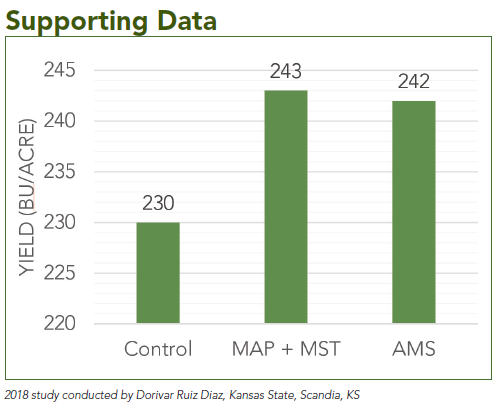Sulfur Management With Smart Nutrition™ MAP+MST® in Kansas
Corn is a crop that has shown some consistency in yield response in much of the north central US due to increasing removal rates with high yields. High yielding corn requires supplemental sulfur above soil supplied levels to maximize yields. A high-density fertilizer containing high concentrations of both phosphorus and sulfur can help ensure nutrient recommendations are met, while also decreasing fertilizer volumes being applied. The following study was designed to evaluate Smart Nutrition MAP+MST (a cogranulated, homogeneous granule) as a sulfur source for corn production in Kansas.
Results summary
- Spring applied pre-plant incorporated applications of sulfur as Smart Nutrition MAP+MST and Ammonium sulfate (AMS) resulted in a 5.5% corn yield increase (roughly 12 bushel).
- Lack of yield difference indicates sulfur oxidation rates of Smart Nutrition MAP+MST were sufficient to match the sulfur availability applied with AMS.
- Applying Smart Nutrition MAP+MST to achieve sulfur recommended rates also partially fulfills phosphorus application rates.
Trial detail
- Conducted in Sandia, Kansas by Dr. Dorivar Ruiz Diaz, Kansas State University
- Soil type: silt loam, pH: 6.3, OM: 3.2%
- Soil test: phosphorus – 6ppm, potassium – 535ppm, sulfur – 6ppm
- Tillage: conventional
- Irrigation: Rainfed
- Small plots in Randomized Complete Block Design (RCBD)
- Hybrid: Pioneer P1366AM


Considerations for corn production
- High nutrient density allows for lower fertilizer volumes applied. An application of 156 pounds of Smart Nutrition MAP+MST per acre to achieve 25 pounds of sulfur, would also supply 14 pounds of nitrogen and 67 pounds of phosphorus.
- High yielding corn requires greater quantities of nutrients, Smart Nutrition MAP+MST allows easy in bulk blending with other fertilizers like urea with limited caking and moisture accumulation compared to AMS.
- Coarser textured soils carry higher risk for leaching losses as sulfate can move more easily through the soil profile. Consider a slow release sulfur fertilizer like Smart Nutrition MAP+MST to protect your sulfur all season long.
- Kansas State University Soil Testing Laboratory offers a sulfate-sulfur (SO4-S) soil test of soil profile samples (0-24 inches). The majority of sulfur in soil is present as organic matter and therefore, soil test may not be a good indicator of plant availability.
- Application recommendations are generally based on soil organic matter concentration, soil type, crop being grown, and yield goals.




